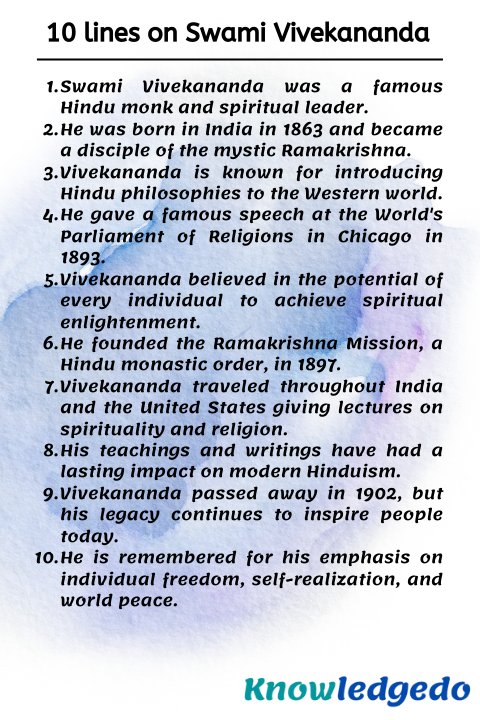Today, we are sharing 10 lines on Swami Vivekananda in English This article can help students who are looking for information about 10 lines on Swami Vivekananda. This essay is very simple and easy to remember. The level of this essay is moderate so any student can write on this topic.
This article is generally useful for class 1 to class 12
10 Easy lines on Swami Vivekananda
1) Swami Vivekananda was a famous Hindu monk and spiritual leader.
2) He was born in India in 1863 and became a disciple of the mystic Ramakrishna.
3) Vivekananda is known for introducing Hindu philosophies to the Western world.
4) He gave a famous speech at the World’s Parliament of Religions in Chicago in 1893.
5) Vivekananda believed in the potential of every individual to achieve spiritual enlightenment.
6) He founded the Ramakrishna Mission, a Hindu monastic order, in 1897.
7) Vivekananda travelled throughout India and the United States giving lectures on spirituality and religion.
8) His teachings and writings have had a lasting impact on modern Hinduism.
9) Vivekananda passed away in 1902, but his legacy continues to inspire people today.
10) He is remembered for his emphasis on individual freedom, self-realization, and world peace.

10 lines on Swami Vivekananda
1) Swami Vivekananda was a Hindu monk and one of the most influential spiritual leaders of the 19th century.
2) He was born in Calcutta, India in 1863 and was given the name Narendranath Datta.
3) Vivekananda became a disciple of the mystic Ramakrishna and played a key role in the introduction of the Hindu philosophies of Vedanta and Yoga to the Western world.
4) He represented India at the World’s Parliament of Religions in Chicago in 1893, where he delivered a speech that became known as the “Chicago Address.”
5) Vivekananda’s teachings focused on the ideals of individual freedom, self-realization, and world peace.
6) He believed that all religions were essentially the same and that each individual had the potential to achieve spiritual enlightenment.
7) Vivekananda founded the Ramakrishna Mission, a Hindu monastic order, in 1897.
8) He travelled extensively throughout India and the United States, giving lectures and teachings on spirituality and religion.
9) Vivekananda’s teachings and writings have had a significant impact on the shaping of modern Hinduism and have influenced numerous spiritual leaders and movements around the world.
10) He passed away in 1902 at the age of 39, but his legacy continues to inspire millions of people today.
FAQ
Answer: Swami Vivekananda was born in Calcutta, India in 1863 as Narendranath Datta. He was a Hindu monk and one of the most influential spiritual leaders of the 19th century.
Answer: Swami Vivekananda became known for representing India at the World’s Parliament of Religions in Chicago in 1893, where he delivered a speech that became known as the “Chicago Address.” This speech introduced Hindu philosophies to the Western world and helped to establish Vivekananda as a prominent spiritual leader.
Answer: Swami Vivekananda’s teachings focused on the ideals of individual freedom, self-realization, and world peace. He believed that all religions were essentially the same and that each individual had the potential to achieve spiritual enlightenment.
Answer: Swami Vivekananda founded the Ramakrishna Mission, a Hindu monastic order, in 1897. He travelled extensively throughout India and the United States, giving lectures and teachings on spirituality and religion. His teachings and writings have had a significant impact on the shaping of modern Hinduism and have influenced numerous spiritual leaders and movements around the world.
Answer: Swami Vivekananda passed away in 1902 at the age of 39.
Answer: Swami Vivekananda’s legacy continues to inspire millions of people today. His teachings and writings have had a lasting impact on Hinduism and have influenced many spiritual leaders and movements around the world. He is remembered for his emphasis on individual freedom, self-realization, and world peace.
